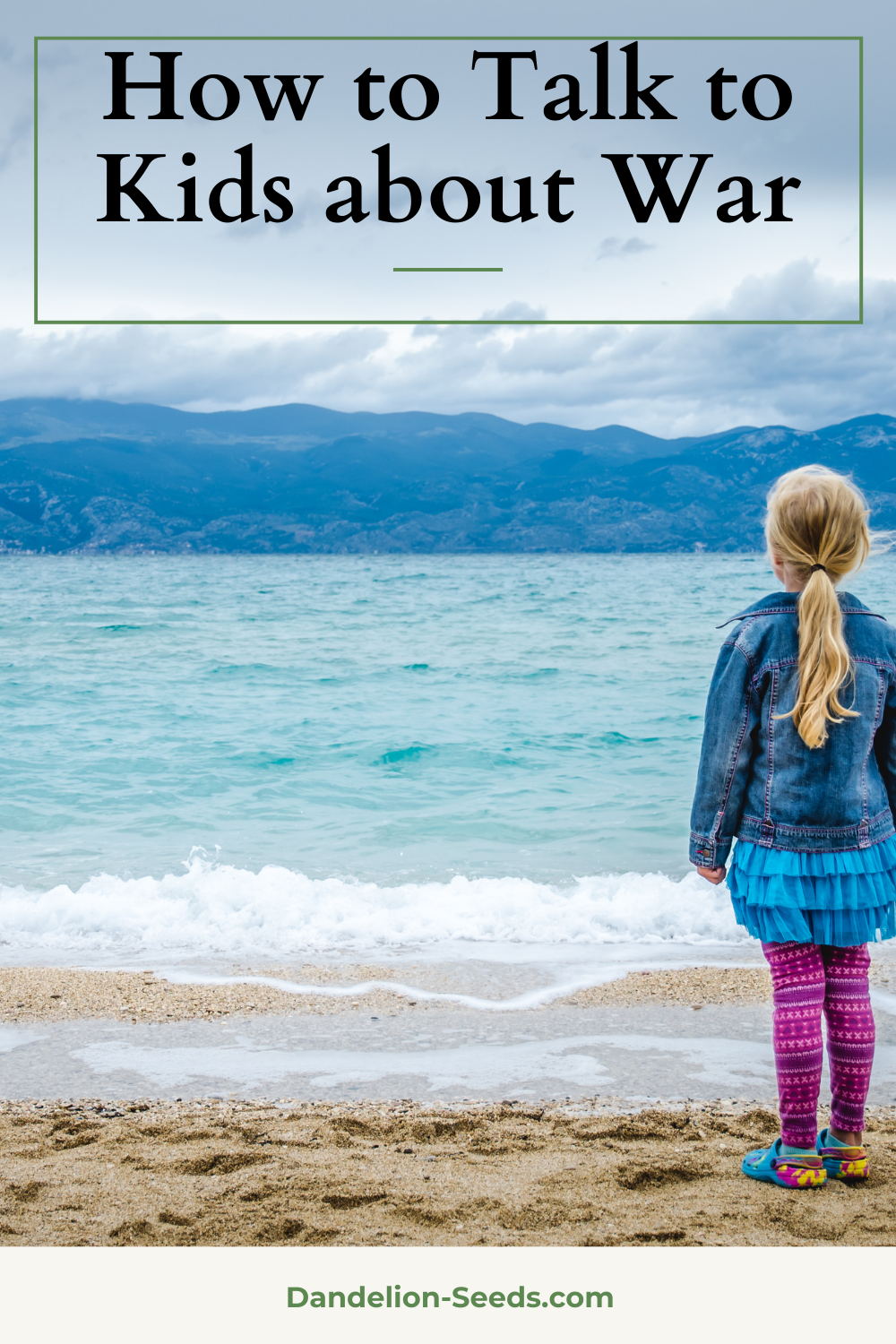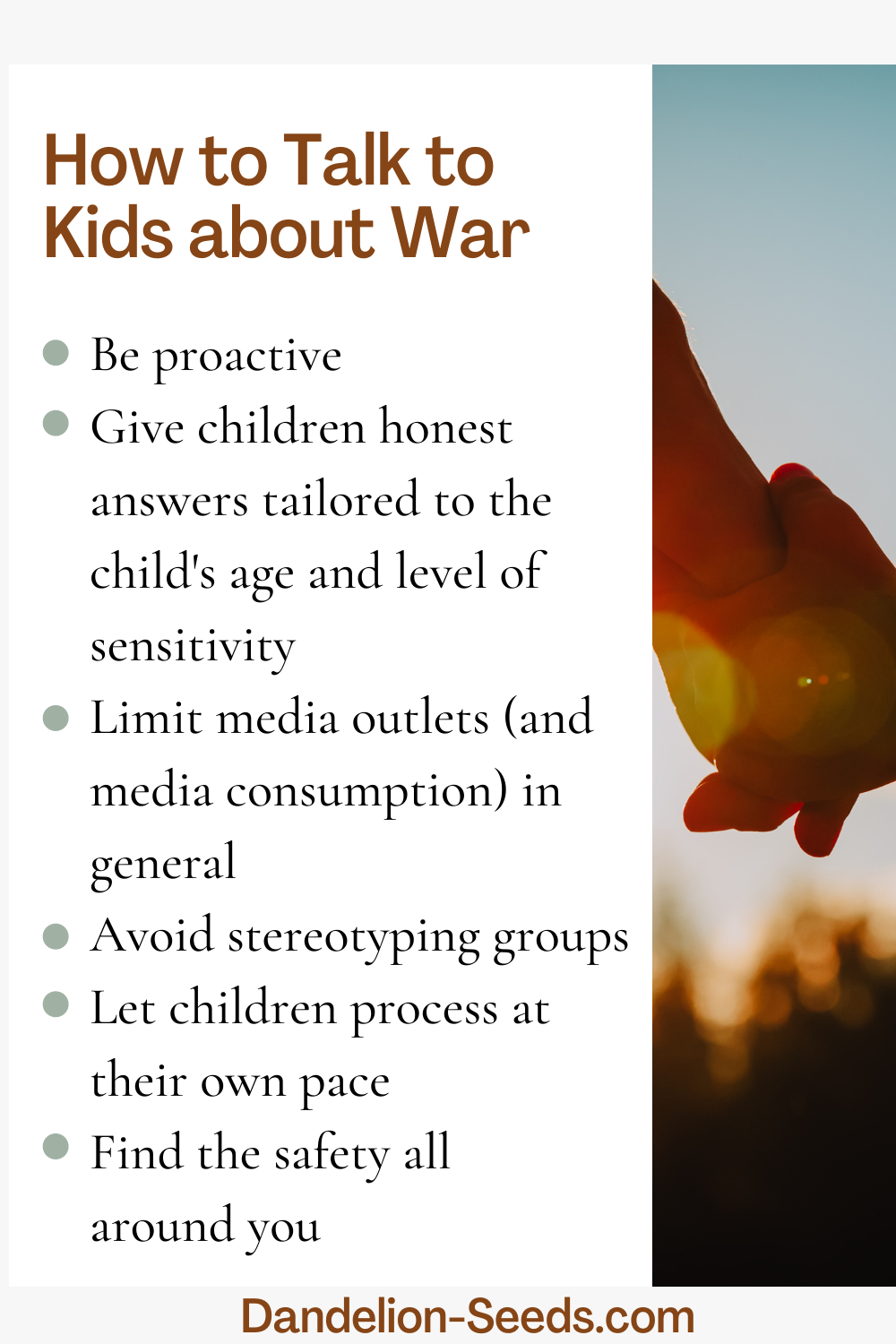
Sign in
Don't have an account with us? Sign up using the form below and get some free bonuses!

I'm here with a message that I never wanted to cover: how to talk to kids about war.
This is a scary time for many of us. I'm unsure whether it's more frightening for kids -- who know little about war -- or for adults, who, frankly, may also understand little about this devastating topic, but who know enough to understand its terrifying ramifications.
We know one thing for sure, though: children are going to hear about it. It will come up at school, on the playground, and in adult conversations they overhear.
Part of the tragedy, of course, is that as a society, we were already deeply enmeshed in a mental health crisis. Even before the recent events in the world, 7.1% of children aged 3-17 years (approximately 4.4 million) had diagnosed anxiety; 3.2% of children aged 3-17 years (approximately 1.9 million) had diagnosed depression. They certainly didn't need the fear of war on top of this.
If we want to help safeguard children's mental health, we need to take action immediately.

We can mitigate children's fears by doing these six things to support our children:
I'll expand on each of these ideas below.
Who would be safer than you -- your child's special and trusted adult -- to tell your kids about the war? Just like with the "sex talk," you don't want your children learning about it from the Internet, or on the playground from older children, or from a neighbor. You want to make sure they're getting accurate and age-appropriate information, to the best of your ability.
Furthermore, many children, even if they haven't yet been told about the war, already know something's up.
How?
Children learn early on what it looks like when we're stressed or worried. They pick it up from us. Chances are, if you've been carrying anxiety this week, you've been projecting it to some degree (which is only human). We're not robots, no matter how good we are at masking our fears.
Personal note: I used my stress as the segue to bring up the topic to my own child, who's eight years old. I sat her on my lap and told her, using a book as a makeshift globe, that a war had started on the other side of the planet. I said that because I was feeling sad and anxious about it, I wanted her to know so she wouldn't wonder why I was upset. I also told her that I wanted her to hear it from me first because I know I'm her safe place emotionally, and that she'd likely hear others talking about it.
Modeling emotional authenticity is important, albeit without terrifying our children. Even for kids, it's disconcerting to know something's bothering a loved one without knowing what it is. Kids understand when we're being disingenuous. When we help them make sense of what they're sensing, it grows their emotional intelligence.
Naturally, you'll want to tailor your message to your child's age and level of sensitivity.
What we know from brain science is that humans like to have complete information; we want to make sense of our stories. It's part of forming a coherent narrative. We struggle with ambiguity, and in the face of ambiguity, it's human nature to guess what might happen.
War is not a time for guessing. Children and adults alike are often drawn to worst case scenarios, so unless we're careful, we can get further caught up in a vicious cycle. Unchecked fear only begets more fear.
You know your child best, so trust your judgment on how much to tell them. It's generally advisable to start small -- bite-sized chunks of information. They'll ask if they want to know more. If they start asking questions to which you don't know the answers, be honest.
Lest the aforementioned ambiguity raise stress levels, tell them what you do know for sure: "I love you. I will do everything in my power to keep you, me, your stuffed animals, our pets, and everyone else safe. Whatever comes up, we'll deal with it."
Note that I did not say, "Whatever comes up, we'll be okay," because we cannot guarantee things will turn out fine. "We'll deal with it" is more accurate, and frankly, more empowering.
Let's be real -- children watch lots of screens these days, and we don't always know what they're seeing. Even if they're playing something benign on our phone while we're otherwise engaged, who's to say a fear-invoking notification won't pop up for them? It's easy to get news they didn't ask for.
Furthermore, even if you're allowing some media (as most of us do), we want to avoid violent or upsetting images. Personally, I'm choosing to keep the television off for the foreseeable future, save for my child's cartoon channel. I decide when to look up the latest news while she's not watching. Media is designed to be attention-grabbing. Most children will do much better if they're not caught off-guard by stressful images.
Remember that people around the world are all just people like us: moms and dads holding newborn babies; children playing at playgrounds; siblings squabbling. Somewhere, right now, a child on the other side of the world is sitting on their mama's lap and reading a story. We do not want to portray them as bad people, or raise concerns that "the enemy" includes entire populations.
Very few of us would want to be defined by the actions of our country's leaders, no matter how much we may (or may not) respect them. We are all our own people, and in some cases, the people of a country vehemently disagree with their leadership.
As a result, it behooves us to avoid saying things like, "the Russians..." or anyone at all. Surely, not all citizens of any country reflect the beliefs of their leadership.
It's unfair to stereotype. It breeds nothing but unfounded hate and fear. Xenophobia is real and all too prevalent.
Explain prejudice to your children, and talk to them about how some people will target people who "look" like the enemy for bullying or other unkind behavior, even right here in their very own communities. Tell them that it's wrong to do this.
Model kindness and acceptance. Teach tolerance. These families are very much like ours, save for speaking other languages.

When I spoke with my own daughter about the war, she seemed to do alright with the discussion. If anything, she seemed relatively indifferent -- at first. Later that day, she had a massive emotional release, undoubtedly related to the stress she was now carrying.
We can't force children to feel their feelings. Many children tend to internalize new information and process it for awhile before their true reactions show. Children may seem fine initially, but have intense reactions later. Delayed responses are known to happen with trauma. Perhaps your child hasn't experienced trauma from war directly, but the very concept of war is, at the very least, jarring.
Watch your child for physical symptoms of stress, such as ongoing trouble sleeping, persistent upsetting thoughts, or seemingly inexplicable physical aches. Especially for young children, tummy aches are a common symptom of anxiety.
It's also common for children under duress to have increased bouts of suboptimal behavior. We all process stress differently. Expect that news of a war, or violence of any kind, is going to affect your child's executive functioning skills. They may "regress" a bit, perhaps be more reactive, or show other signs of internal strife.
Even if your child's struggles don't seem to be connected to discussions about the war, know they likely are connected. Give kids grace; a minor upset that turns explosive may have been the proverbial straw that broke the camel's back. Their stress is real, and it's extremely important to lean in and offer connection to our children rather than punish them for subconsciously expressing their anxiety (even if it comes out in challenging ways).
Be proactive about helping them process. Older kids will benefit from writing stories about their feelings; younger children may be more comfortable drawing pictures. At the same time, you don't want to bring war to the forefront of every conversation. As the adage goes, let them be little. Play is the most natural form of childhood stress relief.
If you're concerned about your children, you'll never go wrong by engaging the support of a qualified mental health professional. Normalize getting extra support from other adults who are trained to help.
Finally, lean into a predictable routine of proactively finding and creating emotional safety in your life. Safety has very little to do with what we say, and much more to do with how we are around each other.
If your child typically releases stress through group activities with friends, go do those. Does your child want to climb trees and play in nature? Great. Do they want to sit on your lap and read stories all day? Perfect. If your family prays, pray together. If you do loving-kindness meditations, do them now.
Personalize safety for your children by being cognizant of what works for them. This is a time for greater connection in whatever form it takes. Above all, they need you.
Lean into each other. We have each other. Even in the midst of turmoil, we can create a sense of safety from within.
Whatever happens, we'll deal with it.
